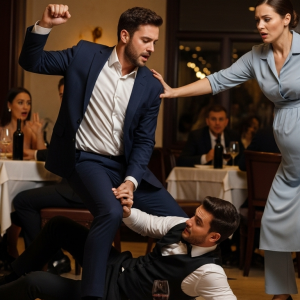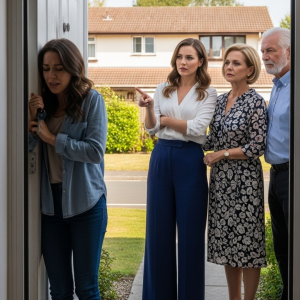I never thought I’d be posting my story online, but the judgment is suffocating. Maybe if I explain my side, someone will finally understand.
My husband and I were married for over 20 years. I was 20 when we said our vows, and he was 24. Back then, he was everything I thought I wanted: stable, dependable, kind. But over two decades, stability curdled into a soul-crushing boredom. Our life together became a flat, gray line of predictable days.
Three years ago, that line snapped. He was diagnosed with a chronic illness that stole his vitality and his ability to work. Suddenly, I wasn’t just a wife; I was a full-time caregiver. Our world shrank to the four walls of our house, and every conversation orbited around his pain, his treatments, his exhaustion. He stopped being my partner and became my patient. I was drowning, holding everything together—working, paying the bills, raising our daughter, and playing nurse to a man who was fading before my eyes. I was profoundly, utterly alone in that marriage, and nobody seemed to notice.
Then, about a year ago, I met Jake at work. He’s younger, vibrant, and he saw me. Not the tired caregiver, not the weary wife, but the woman I used to be. He made me laugh. He complimented me. He made me feel alive again. I didn’t plan for an affair, but it happened. It was my escape, a small pocket of joy in a life defined by duty and decay. The more time I spent with Jake, the more I realized I deserved to be happy. My husband’s illness shouldn’t be my life sentence too.
He found out, of course. He begged me to stay, to try therapy, but my heart had already left. I moved out. He wouldn’t stop calling, his texts a constant reminder of the life I was leaving behind, pleading about how much he needed me. I had to be firm. “I can’t live my life for you anymore,” I told him, the words tasting like ash.
Six months ago, he ended his life. Our daughter, only 16, was the one who found him. Her sobbing phone call is a sound that will haunt me forever, but what could I say? It was a tragedy, yes, but it was his choice. I cannot carry the weight of his decisions on my shoulders.
After the funeral, my daughter shut me out completely. She moved in with her grandparents and refuses to speak to me. She clings to her father’s memory, building a shrine of resentment with me as the villain. She won’t even entertain the idea of meeting Jake, who has been my absolute rock through this nightmare. He’s helped me see that I’m not a monster. I’m just a woman who chose to live.
So, tell me, why am I the one being punished? Why should I feel guilty for finally choosing my own happiness while my daughter chooses to remain a prisoner of the past?
My mother posted her story here, painting herself as a victim. Now it’s my turn.
My dad was my hero. He was the kind of father who built blanket forts, told the silliest bedtime stories, and spent hours helping me with homework, even when he was exhausted from work. When he got sick, everything changed. I was only 13, but I knew it was serious. My mom’s reaction? A sigh. An inconvenience. His illness was a disruption to her life.
She started disappearing. “Working late,” she’d say, while I was at home learning to cook so my dad could have a hot meal. When she was home, she treated him like a burden. I heard the fights. “I didn’t sign up for this,” she’d hiss at him. And my dad, bless his heart, would apologize, as if his own suffering was his fault.
I found the messages on her phone by accident. Texts to a man named “Jake.” She called him the “love of her life” while my father was wasting away in the next room. When I confronted her, she didn’t even have the decency to look ashamed. “You’ll understand when you’re older,” she said with an eye-roll.
It broke him. I watched the light go out in his eyes. He begged her to stay. He told me one night, his voice barely a whisper, “Maybe if I weren’t sick, she’d still love me.”
A few days after she moved out, I came home from school to a house that was too quiet. I found him in the garage. The image is burned into my mind forever. I called for help, but it was too late. Do you know what my mother said when I called her, screaming and sobbing? “I’m sorry, but this isn’t my fault.” She didn’t come. She left her 16-year-old daughter to deal with the police, the paramedics, the entire horrific aftermath, alone.
Now she wants me to meet Jake. She wants me to forgive her. She calls me “selfish” for cutting her off.
Mom, if you’re reading this, stop. Stop rewriting history. You’re not the victim. You made your choice. You left him to break. Now, you have to live with it.
I grew up in the shadow of my older sister, Vanessa. She was the golden child—charming, outgoing, and endlessly spoiled. I was the responsible one, the “serious” one who worked for everything I had. My parents enabled her every whim, especially her disastrous financial habits. Credit card debt, car payments—they always bailed her out. I never asked for a dime.
Two years ago, my husband and I were scraping together every penny for our wedding. At the same time, Vanessa was planning a lavish, over-the-top affair she couldn’t possibly afford. That’s when my world imploded.
Out of nowhere, my parents cornered me, their faces grim with accusation. Vanessa claimed I had stolen her wedding fund—thousands of dollars transferred from her account to mine. She had “proof”: doctored screenshots of bank transfers.
I was stunned. I would never steal from anyone, let alone my own sister. I pleaded with them, begged them to see reason, but they wouldn’t listen. Vanessa put on an Oscar-worthy performance, crying about how I had betrayed her trust and ruined her future. My parents demanded I pay back the money I never took. When I refused, they disowned me.
The news spread like wildfire through our extended family. I was ostracized, bombarded with hateful messages, and blocked on social media. It was a public humiliation orchestrated by my own sister. Meanwhile, my parents paid for Vanessa’s dream wedding with the money she claimed I stole.
I spent the next two years rebuilding. My husband and I had a small, beautiful wedding surrounded by his family and true friends. We built a life for ourselves, free from the toxicity. And honestly? I’ve never been happier.
Vanessa’s life, however, went in the opposite direction. Her marriage crumbled in less than a year after her husband discovered her massive gambling addiction. She’s now broke, divorced, and living back at home with our parents, who are once again funding her life.
A few weeks ago, my mother called, begging me to come over. I found them steeped in regret. They had discovered the truth. There was no wedding fund. Vanessa had invented the entire story to pay off her gambling debts, using me as a scapegoat because she knew they would believe her.
After years of being treated like a criminal, their apology felt hollow. Then came the real reason for the summit. They wanted me to forgive Vanessa. “She’s struggling,” my dad said. “The family needs to come together.”
“Has Vanessa apologized?” I asked.
My mother shifted uncomfortably. “She’s not ready yet. She’s been through a lot.”
I left, telling them I needed time. But I’m furious. Vanessa destroyed my reputation and my family relationships, and she still hasn’t taken an ounce of responsibility. And my parents, after everything, are still enabling her.
I agreed to meet them one last time. When I arrived, the apologies started again, a cascade of “we should have known better” and “we’re so ashamed.” Vanessa then walked in, smiling casually as if we were about to catch up over coffee.
“So, I guess they told you everything, huh?” she said.
I just stared at her. “They told me you lied and blamed me for your gambling debts.”
She shrugged. “I didn’t think it would go this far,” she offered, a pathetic excuse for an apology. “Besides, you’re happy now with your husband. Unlike me.”
The audacity was breathtaking. I recounted the years of pain, the harassment, the loneliness her lie had caused.
Her response? “That’s not my fault. Mom and Dad were the ones who overreacted.”
I looked at my parents, waiting for them to finally hold her accountable. They said nothing. Emboldened by their silence, Vanessa had the nerve to lecture me about holding grudges.
I stood up. “It matters because you destroyed me. You lied, and they believed you. And you’re still not sorry.”
I walked out, leaving them to their dysfunctional family reunion. My mom has been texting, saying Vanessa is in therapy now, that she’s “trying.” But I can’t go back. Forgiveness doesn’t require reconciliation. I can forgive them for my own peace, but I will never let them back into my life. As for Vanessa, she hasn’t earned forgiveness because she hasn’t even begun to understand the damage she’s done.
My older sister has always been… a lot. Entitled is the polite term. Christmas last year, however, she crossed a line.
Our family gathers at my grandparents’ house on Christmas Eve. I was traveling for work and wasn’t sure I’d make it, so I shipped a large box of pre-wrapped presents for my relatives ahead of time, just in case. Luckily, I managed to drive home the day before.
The evening was going well until it was time to open gifts. All of my presents had the same distinctive wrapping paper. When my two young nephews, ages five and six, received their gifts from me, my sister pointed to new name tags pasted over my original ones.
“Oh, look!” she exclaimed with theatrical glee. “Those are from Santa!”
The boys, ecstatic, tore them open. I saw red. My sister saw the look on my face and pulled me into the kitchen.
“What the hell do you think you’re doing?” I demanded.
She stammered, offering a lame excuse. “Well, I thought you weren’t going to be here! It’s better for the kids if they think it’s from Santa.”
“Better for the kids, or better for you?” I yelled, my voice rising. My grandmother rushed in, begging me to keep quiet, to not ruin the “magic.” That’s when I lost it. The commotion drew half the family into the kitchen.
“She relabeled the gifts I bought for my nephews!” I announced to the room.
My grandfather looked at my sister, his expression firm. “Is this true?”
She did what she always does when she’s caught: she crumpled to the floor and started sobbing, a full-blown pity party. My grandfather, however, was unfazed. He and several other relatives agreed she needed to make it right. “That means the boys technically got nothing from you,” he said pointedly.
An idea sparked. “Fine,” I said, pulling out my wallet. “I’ll give each of them $50. And you,” I said, looking directly at my sister, “will pay me back for that, and for the gifts you hijacked.”
My brother-in-law sighed and nodded in agreement.
I gave my nephews each a crisp $50 bill and told them to buy whatever they wanted. My sister spent the rest of the night in stony silence.
The next day, she and her husband showed up at my door. She meekly handed me an envelope with $200 and mumbled an apology, immediately trying to launch into another string of excuses before her husband cut her off.
“Just stop,” he said, his voice weary. “What you did was a crummy thing. There’s no excuse.”
He told me the money came directly from her “fun money” account for the month. “Maybe having a leaner month will teach her a lesson,” he said. I doubt it, but for the first time in a long time, it felt like a small victory.
My daughter’s post spread like a wildfire. Friends, former colleagues, and distant relatives I hadn’t spoken to in years read it. The judgment I’d felt before was a light smoke; this was a wall of flame surrounding me. Her words, sharp as knives, had shredded the narrative I had so carefully constructed for myself. She didn’t just tell a different story; she exposed a truth I hadn’t dared to face.
Jake tried to be supportive. “Don’t listen to them, baby,” he’d say, scrolling through the vicious comments on his phone. “She’s just a hurting kid. She doesn’t understand.” But I began to see the cracks in his patience. His compassion had a limit, and it was being tested by a tragedy that wasn’t his. One evening, after I received a vitriolic text from my own sister, he sighed and put his phone down. “Look,” he said, his tone shifted, no longer soft. “You’re going to have to deal with this at some point. This mess… it’s starting to affect us.”
Us. The word hung in the air. I had left my old life, believing Jake was my new beginning, my salvation. But I had brought my ghosts with me, and they were haunting our new home. Jake hadn’t fallen in love with a complex, damaged woman with a tragic past; he’d fallen for the idea of a woman he had rescued. Now that the rescue required actual work, he was pulling away.
I couldn’t sleep that night. I walked into the living room, the streetlights casting long shadows across the floor. I had told myself I deserved to be happy. But what was happiness? Was it the temporary quiet I’d found with Jake, a quiet now shattered by the echoes of my choices? I thought of my husband, not the sick, tired man at the end, but the young man I had fallen in love with. I thought of my daughter’s laughter when she was little.
For the first time in months, I didn’t feel like the victim. I felt like an architect—the architect of this destruction. I had chosen the bricks, mixed the mortar, and built this prison of loneliness, one selfish decision at a time. And now I was sitting in it, alone, realizing that “moving on” isn’t about finding someone new. It’s about learning to live with the person you’ve become. And I wasn’t sure if I could.
The silence from my parents lasted exactly one week. I had expected it, the awkward stillness after my departure. What I didn’t expect was the call from my aunt, my mother’s sister.
“Clara, I’m so sorry,” she began, her voice dripping with counterfeit remorse. “None of us knew the truth. We just heard what your parents said. Vanessa had everyone convinced.”
I listened, keeping my voice calm and cool. “So why are you calling now?”
“Well… your mother is a wreck. She says you’re tearing the family apart. She thinks you should be the bigger person and forgive Vanessa for everyone’s sake.”
A cold fury slid down my spine. “For everyone’s sake? Or for Vanessa’s? You know, for two years, not a single one of you called to hear my side. You were all happy to throw me away. Now that the truth is out, you don’t want to feel guilty, so you want me to pretend it never happened. The answer is no.” I hung up before she could reply.
It was empowering. Setting that boundary felt strong. A few days later, I received a text from Vanessa herself.
I can’t believe how selfish you’re being. Mom and Dad are so stressed out because of you. You have your perfect life, so why can’t you just let this go? You always have to be the one who’s right, don’t you?
I read the text, and instead of anger, I felt a profound sense of pity. She still didn’t get it. She never would. She lived in a world where actions had no consequences because my parents were always her safety net. She didn’t blame herself for the lies or the debt; she blamed me for not cleaning up her mess quietly.
I showed the text to my husband. He wrapped his arms around me and said, “This is why we can’t go back. That environment is toxic. You escaped.”
And he was right. That evening, we sat on our back patio, watching the sunset paint the sky in shades of pink and orange. Our home, our life—they were peaceful. I realized that forgiveness isn’t a single event. It’s a process. I could forgive them for their weakness, for their failure as parents and as a sister. But I would do it from a distance. My forgiveness was for my own peace; it was not an invitation for them to re-enter my life. Family isn’t just blood; it’s trust. And they had burned that trust to ashes.
My sister’s “leaner month” came and went, and just as I’d predicted, no lessons were learned. The only lesson she might have picked up was how to be more subtly venomous.
We saw each other again a few months later at a spring barbecue at my grandparents’ house. The atmosphere was initially tense. My sister, rather than being contrite, adopted a new tactic: treating me with a sickeningly sweet kindness.
“Oh, Mark! It’s so good to see you!” she chirped, her voice dripping with falsehood as she gave me a stiff hug. “You look great. Life must be treating you well now that you’re not so angry at everyone all the time.”
It was a subtle jab, designed to paint me as the angry, unforgiving one. My grandmother, her eternal enabler, nodded in agreement. “Yes, it’s so good to see you two getting along again.”
I just smiled and said nothing. I wasn’t going to play her game. But throughout the afternoon, she continued with the micro-aggressions—backhanded compliments, selectively retold stories of my past mistakes, all delivered with a smile. She was trying to rewrite the narrative, to make me the villain for having dared to hold her accountable.
Later, as I was helping my brother-in-law, Bill, clean the grill, he shook his head. “I’m sorry about her,” he said quietly, so only I could hear. “She hasn’t changed. After she paid you, she spent a week complaining about how you ‘publicly humiliated’ her.”
“So why do you put up with it?” I asked, a genuine question.
Bill looked across the yard, where my sister was laughing with my nephews, playing the part of Mother of the Year. He let out a long sigh, a sound that held the weight of a decade of disappointment. “Because of the kids. And because… this is who she is. I’ve stopped hoping she’ll become someone else. Now, I just try to run damage control.”
That conversation changed everything. I no longer saw a victory in the Christmas confrontation. I just saw a sad reality. My brother-in-law was living in a marriage built on damage control, and my sister would never change. I may have won a battle, but the war against her nature was one Bill had to fight every single day.
As I drove home that night, I felt a cold sense of relief. I had set a boundary. I had demanded respect and, begrudgingly, received it. But I also realized my relationship with my sister would always be a careful negotiation of distance. I would always have to be on guard, always ready for the next stunt. It wasn’t a happy thought, but it was the truth. And accepting that truth was the only form of peace I was likely to get.




